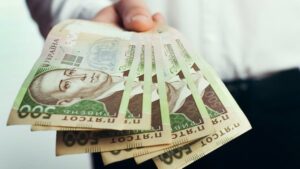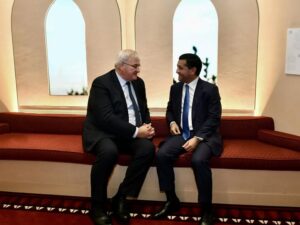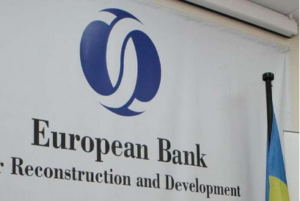
The average monthly salary of full-time employees in August 2025 decreased by 2.2% compared to July 2025 and amounted to UAH 25,911, the State Statistics Service (SSS) reported on Tuesday.
According to Gosstat, total wage arrears in August this year increased by 3.3% compared to the previous month of 2025 and amounted to UAH 3.517 billion as of September 1, 2025.
According to the statistics agency, in August 2025, the average monthly wage increased in the public administration and defense sector by 3.6% to UAH 53,125, in the arts, sports, and entertainment sector by 2% to UAH 18,504, in construction by 1% to UAH 22,997, in agriculture by 0.8% to UAH 25,127, in water transport enterprises by 0.6% to UAH 24,869, and in real estate operations by 0.3% to UAH 23,062.
At the same time, there was a 10% decrease in salaries in education, down to 14,432 UAH, healthcare – by 6.9%, to UAH 18,672, in financial and insurance activities – by 6.7%, to UAH 52,269, in temporary accommodation and catering – by 3.1%, to UAH 19,001, information and telecommunications – by 3%, to UAH 65,213, in transport, postal and courier services – by 2.8%, to UAH 26,038, in administrative services – by 1.3% to UAH 20,080, wholesale and retail trade – by 0.9%, to UAH 31,134, air transport enterprises – by 0.6%, to UAH 57,582, professional, scientific, and technical activities – by 0.5%, to UAH 33,906, in industry – by 0.4% to UAH 28,951, in other services – by 0.4% to UAH 29,002.

On the sidelines of the UN General Assembly session in New York, Uzbek Foreign Minister Bakhtiyor Saidov met with Ukrainian Foreign Minister Andriy Sibiga.
The parties discussed topical issues of bilateral cooperation, including trade, investment, education and cultural exchange, as well as key aspects of cooperation in multilateral formats within international organizations.
“The meeting confirmed the mutual commitment of Uzbekistan and Ukraine to deepen dialogue, strengthen partnership and develop new opportunities for the benefit of our peoples,” Bakhtiyor Saidov said.
Andriy Sybiga wrote on his page on the social network X that the parties agreed to resume political dialogue and expand bilateral and multilateral cooperation in various fields.
“Ukraine seeks to develop relations with Uzbekistan and strengthen ties with Central Asian countries,” the statement reads.

Freight traffic in January-August 2025 amounted to 208.9 million tons, which is 11.3% less than in the same period in 2024, while in January-July the decline was 12.6%, according to the State Statistics Service (Gosstat) website. According to its data, rail transport remains the leader in terms of freight volume, with 106.9 million tons, which is 9.4% less than in the same period last year.
Rail freight turnover for the reporting period amounted to 67.70 billion tons/km, which is 11.8% less than for the same period in 2024.
According to the State Statistics Service, road transport carried 77.4 million tons of cargo in the first eight months of this year, which is 9.3% less than in the first eight months of 2024.
Cargo transportation by water transport in January-August 2025 amounted to only 0.6 million tons, or 53.3% of the volume in January-August 2024.
Data on cargo transportation by pipeline and rail during martial law is not disclosed. As reported, the volume of cargo transportation in 2024 increased by 7.8%, and cargo turnover by 13%, to 184.58 billion tons/km.
At the beginning of this year, the decline in freight traffic in Ukraine accelerated and reached 18.5% in the first four months, including a 21.3% decline in rail transport, but since then the decline has been slowing down every month.

If most hotel projects in Ukraine are completed in 2025–2026 and demonstrate financial stability, the market will see a “second wave of boom,” according to Apartel Resorts partner Yevgeny Kudryavchenko in an interview with Interfax-Ukraine.
“We saw the first boom in 2021-2022, but the war interrupted these processes. Now there is cautious growth, and if the facilities prove their effectiveness, there will be a new surge of interest and significantly more foreign investors,” he said.
Kudryavchenko emphasized that apart-hotels could become an important part of the infrastructure for future tourism and business travel in Ukraine.
Apartel resorts is a development company specializing in apart-hotel and hotel real estate projects in Ukraine.

Ukraine’s economy may grow by about 4% in 2025, but the outlook remains fragile and depends entirely on external factors. This is stated in the latest report of the European Bank for Reconstruction and Development (EBRD) Regional Economic Prospects: Under Pressure.
According to the document, the main source of support for the Ukrainian economy is international financial aid, which is used to cover budget expenditures, social payments and defense. An additional driver of growth is the export of agricultural products through the EU “solidarity corridors” and alternative routes along the Danube and overland, which partially compensates for restrictions on maritime transportation.
There has also been a gradual recovery of infrastructure, including roads, bridges and the power grid, which is supporting economic activity.
However, the EBRD warns of high risks. Among them are a protracted war, high levels of public debt and inflation, as well as the vulnerability of export flows, which could be sharply reduced if sea routes are blocked.
According to the bank’s experts, digitalization of public services, agro-technology and development of renewable energy remain promising areas for Ukraine. However, this requires sustainable peace or conflict freezing, deeper integration with the EU market, as well as progress in judicial and anti-corruption reforms.
At the end of 2024, Ukraine’s GDP was estimated at around $160 bln. More than 60% of exports were agro-products (grain, oilseeds and processed products). The metallurgy, IT and energy sectors also retain potential for recovery.
The EBRD emphasizes that the Ukrainian economy is “under pressure”, but with continued international support and access to external markets, it can grow rapidly, laying the foundations for post-war transformation.

Digitalization is becoming a key driver of private medicine development in Ukraine, with online appointment, electronic medical histories, telemedicine consultations and automatic reminders forming a “new culture of care”, Oxford Medical claims.
“Today’s patient wants to get a consultation quickly and conveniently. Online appointment in two clicks, test results in an app, personalized treatment plans – this is the standard without which private medicine no longer exists,” said Angelina Moroz, medical director of the Kiev branch.
The company also introduces personalized support: administrators and managers act as guides for patients, and doctors remain involved at all stages – from diagnosis to postoperative follow-up.
Oxford Medical – a network of clinics, founded in 2005, covers dozens of cities in Ukraine. Hundreds of specialists work in the staff. The company relies on digitalization, telemedicine and integration with the NHS, developing standards of quality service and focusing on the needs of patients.